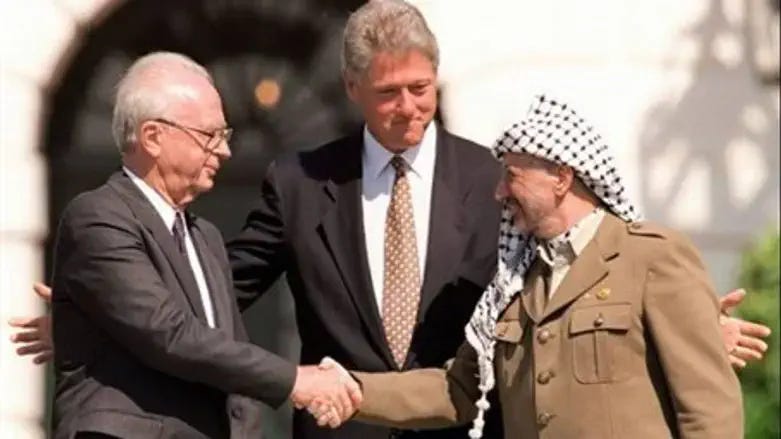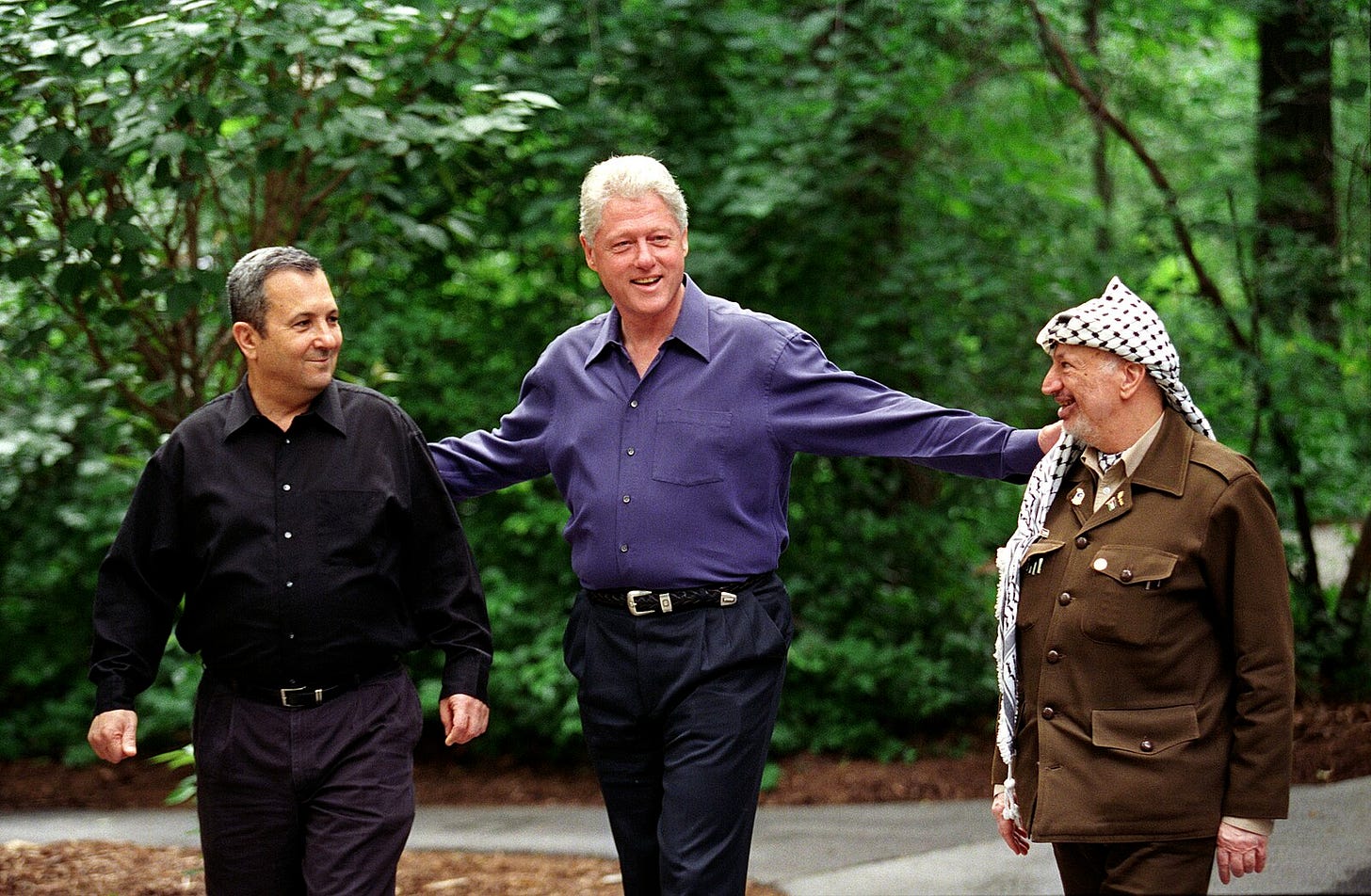A Former President Presents Inconvenient Facts To Young Protesters
"The Palestinians would also have had a capital in East Jerusalem. It was everything Arafat had been negotiating for since the process had begun in 1994. But he said 'no.' Clinton was devastated."
By Michael Golden

I’ve written a few times in this space that “young people are smart.” I’ve experienced it myself while teaching college students, and watching their passion for a cause can be genuinely inspiring.
But I’ve also written that “smart” can be a very subjective standard. And when it comes to complex, deep-rooted international conflicts, knowing history is a lot more important then being smart or having heart. If a person is advocating on behalf of another people or country — but don’t know or refuse to understand the history — their cries will not get them very far.
Twenty five years ago, on the very first day I ever spent in Israel, I sang Hatikvah with other Jews at Independence Hall in Tel Aviv. On the very same afternoon, President Bill Clinton was meeting one last time in Oslo, Norway with Israeli Prime Minister Ehud Barak and Palestinian President Yasser Arafat. Barak had succeeded P.M. Yitzhak Rabin, who had been assassinated by a right wing radical four years earlier — almost to the day. That murderer, who shall not be named here, shot Rabin after he had signed off on a historic peace framework between his beloved country — which he’d defended on the front lines for decades — and the Palestinians. He took a big risk, and he paid the ultimate price for it.

A few days ago, President Clinton spoke publicly about the fact that at the very end of his presidency, Arafat did an about-face and turned down the historic peace deal that was finally on the table. Clinton has explained before that if the Oslo Accords had been signed, they:
“would have given the Palestinians a state on 96 percent of the West Bank and 4% of Israel, and they got to choose where the 4% of Israel was.”
The Palestinians would also have a capital in East Jerusalem. It was everything that Arafat had been negotiating for since the process had begun in 1994. But he said “no.” Clinton, who was in ‘the room where it happened,’ was devastated:
“The only time Yasser Arafat didn’t tell me the truth was when he promised he was going to accept the peace deal that we had worked out.”
In Clinton’s most recent interview, he said that when he talks to young people today who are protesting on behalf of the Palestinians — and tells them these facts of history — they are “shocked.” He elaborated in his NYT Dealbook interview with Andrew Ross Sorkin:
"All [young people in America] know that a lot more Palestinians have been killed than Israelis. But they don't know the history behind that. I tell them what Arafat walked away from, and they, like, can’t believe it. You can’t complain 25 years later when the doors weren’t all still open, and all the possibilities weren’t still there.”
There’s a deeper lesson here if one looks not only at that history from 25 years ago, but what has happened since and what is happening right now. And I pray that young people who truly care about the Palestinians’ future will take a very clear look at it:
Because Arafat declined peace at that last moment, the strife between Palestinians and Israelis continued. Many would say it worsened. Even when Israel got out of Gaza in 2005 and left Gazans to govern themselves, they elected Hamas into power. I have described Hamas many times here, but for the purposes of this article, the only thing that matters is that Hamas in no way wants any kind of peaceful coexistence with Israel. It is a nonstarter.
If you have a neighbor who is so angry or ideologically bent that he only wants to keep attacking you — instead of negotiating a better relationship — what choice do you have but to attack back. To defend. It’s a rhetorical question. Your neighbor has given you no choice.
What so many of the protesters today do not understand is that there are millions of Jews who also want a better life for Palestinians. As Clinton explained, the Israelis who were attacked near the Gaza border on October 7 were among those who have been most supportive of a Palestinian state.
If you take a look at the countries in the Middle East that have made peace or normalized relations with Israel, you’ll see states that have taken a pragmatic approach that will best economically benefit their peoples: Egypt, Jordan, Morocco, Bahrain, Sudan, and the United Arab Emirates. None of these nations have a regime in power that disallows Israelis as a people.
But Hamas does. It has no interest in any kind of coexistence with Israel. It wants Israel obliterated. Gone.
Because of that fact, young protesters would be well served to observe that Israel isn’t going anywhere. And every minute that Hamas remains in power — over plenty of Palestinians who actually desire a more peaceful future — is more time wasted. And more violent conflict.
Folks who sincerely want a better life for Palestinians would be far better served by carrying protest signs that call for Hamas to free the Palestinians. Give them a chance at something different.
They came so close 25 years ago. History matters.
MICHAEL GOLDEN is the Editor-In-Chief of JEWDICIOUS and founder of The Golden Mean.
From navigating the nuances of family and relationships to unpacking history and politics to finding the human angle on sports and entertainment — plus our unsparing take on what’s happening in the Jewish world — the canvas at JEWDICIOUS is limitless!




